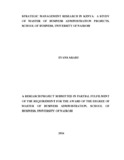| dc.description.abstract | Research in strategic management has changed over the years; research methodologies
have been influenced by the dominant theoretical framework of the time. Early strategy
scholars preferred the case method on planning formats in large and private
manufacturing firms. Over time research in strategic management have changed to
require multiplicity of methods and covers every industry. The objective of the study was
to determine the strategic management research trends in Kenya as shown in Masters of
Business Administration projects, School of Business, University of Nairobi. The
researcher collected primary data from completed and submitted masters of business
administration projects for period 1998 - 2012, school of business, university of Nairobi.
A total of 1257 projects were selected for the study of strategic management research
over the 15 years period. The literature review focused on theories anchoring strategic
management research and evolution of strategic management research. Dominant theories
anchoring strategic management have influenced research in designs in the field from
time to time. The study found that strategy implementation, strategic response to
environmental changes and competitive strategies/ advantage constituted 69% of total
strategic management research projects. In addition it was observed that private firms
formed 69% of researched organizations, government departments at 27% while nongovernmental
organizations, hybrid and religious organizations only 4% of projects
selected for study. In terms of research design, case studies were the majority at average
62% and survey at 38%. Banking industries had more firms researched than any other
industry in Kenya at any average of 28% per year. Others were distributed as follows:
telecommunications 8%, health 9%, education 7%, energy and petroleum 7%,
manufacturing and allied services 9%, transport 8%, commercial services 6%, insurance
6%, agriculture 7%, hospitality, tourism and others industries 5%. The study has elements
from the theory and previous studies. For example Furrer, Thomas and Goussevskaia
(2008), studying the evolution of strategic management identified six main issues:
strategy and its environment, strategy process and top management, corporate strategy
and financial models, growth and market entry, industry and competition and the
resource-based view of the firm. In this study, main themes identified strategic
management practices, strategy implementation, change management, responses to
environmental changes and competitive advantage with responses to environment and
competitive advantage on the rise. The study recommends that more research be done on
non-governmental organizations and religious institutions to reflect their influence in
Kenya society. In addition it recommends that longitudinal studies especially on
resource-based view of organization be introduced and supported by the school of
business. The study has suggested that further similar research could be done on MBA
programs in other university for comparison purposes. | en_US |



